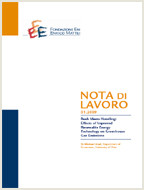(Anti-) Coordination in Networks

10.04.2010
Jaromir Kovarik, Friederike Mengel, José Gabriel Romero
C72, C90, C91, D85
Game Theory, Networks, Coordination Problems, Experiments
Climate Change and Sustainable Development
Carlo Carraro
We study (anti-) coordination problems in networks in a laboratory experiment. Partici- pants interact with their neighbours in a fixed network to play a bilateral (anti-) coordination game. Our main treatment variable is the extent to which players are heterogeneous in the number of connections (neighbors) they have. Other network characteristics are held constant across treatments. We find the following results. Heterogeneity in the number of connections dramatically improves the rate of successful coordination. In addition, even though there is a multiplicity of Nash equilibria theoretically, a very sharp selection is observed empirically: the most connected player can impose her preferred Nash equilibrium almost always and observed Nash equilibria are such that all links are coordinated. As a second treatment variation we let agents decide endogenously on the amount of information they would like to have and find that local (endogenous) information is equally efficient in ensuring successful coordination as full information. We provide an intuitive explanation of these facts which is supported by our data.
